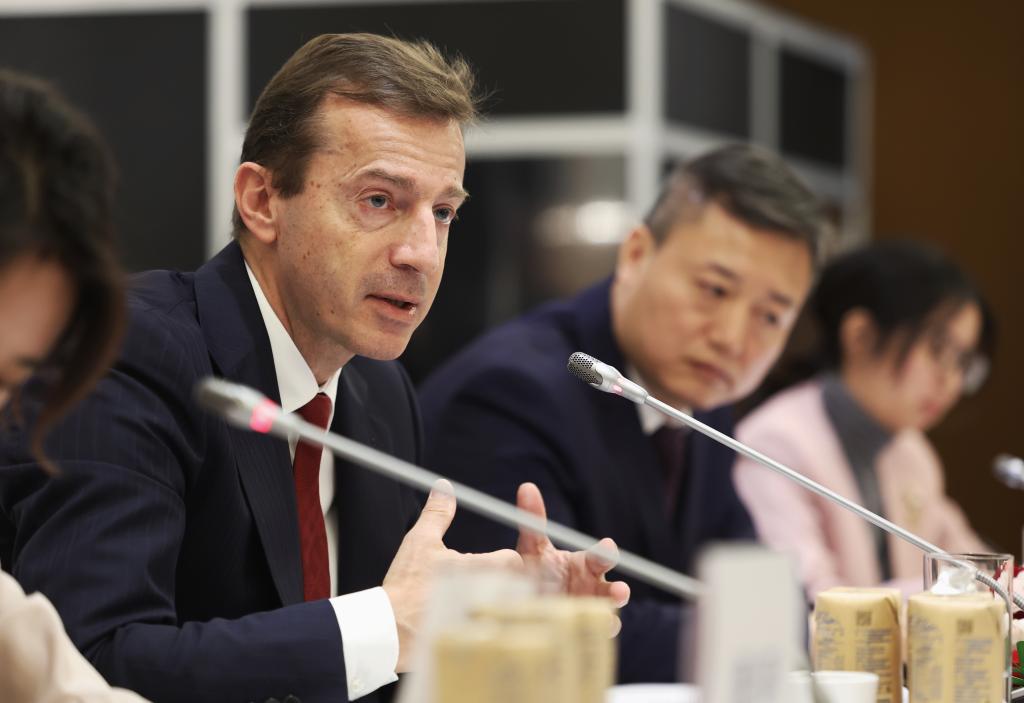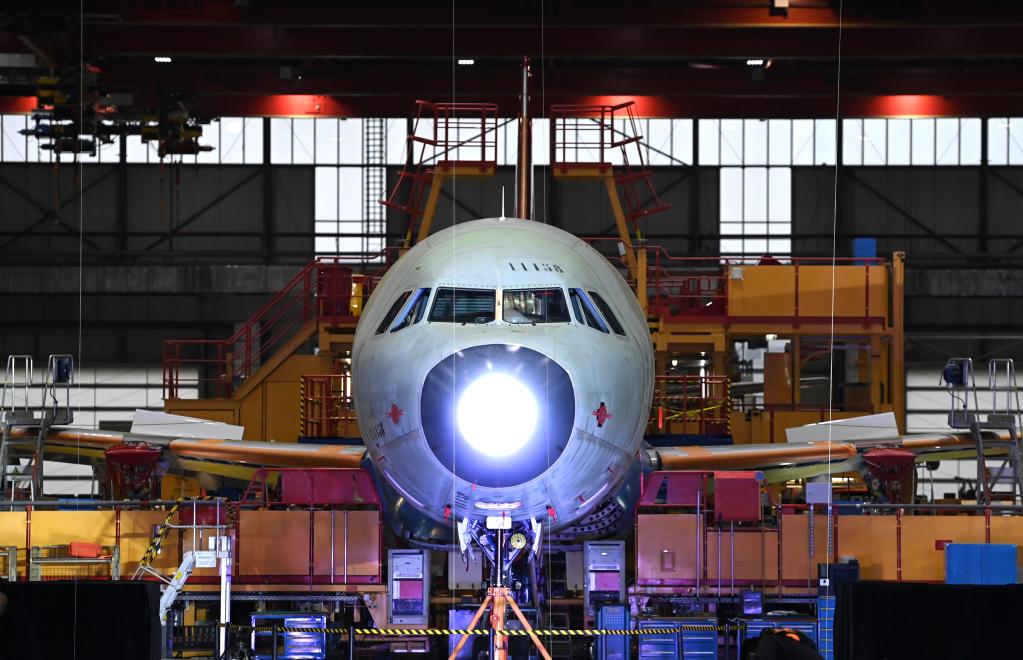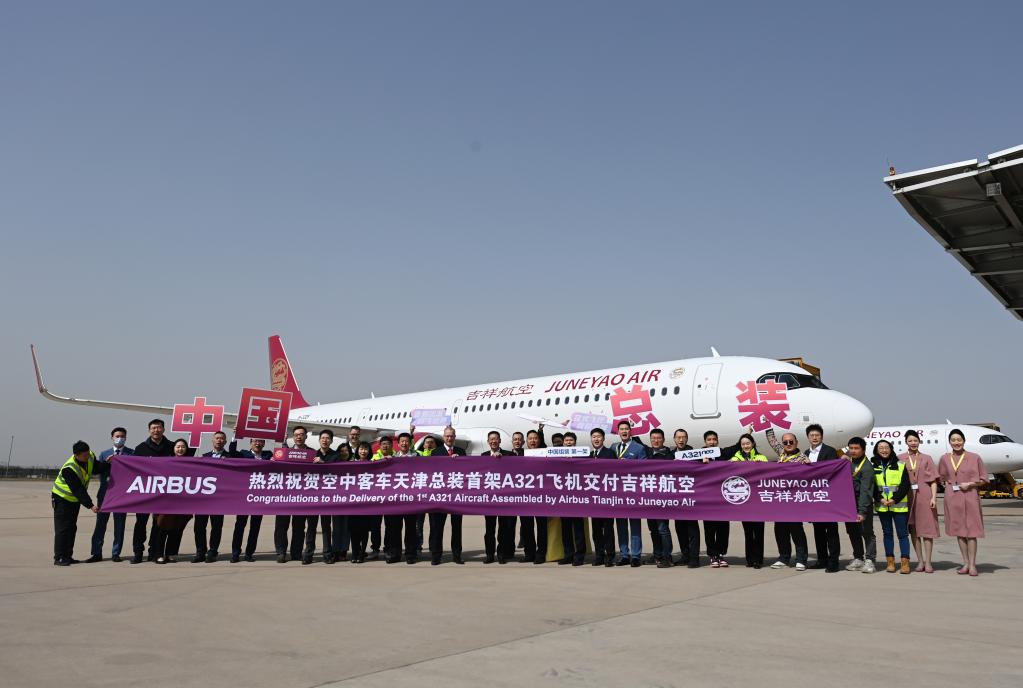Interview: Airbus CEO values continuous, diversified cooperation with China

This photo shows Airbus CEO Guillaume Faury (left) in an interview in Beijing. (Airbus China/Handout via Xinhua)
BEIJING, April 11 (Xinhua) -- European aircraft manufacturer Airbus will continue its long-standing cooperation with China in diversified dimensions of the aviation industry, highlighting moves in airplane production and decarbonization, said Airbus CEO Guillaume Faury.
"What is amazing in China is always the energy, the speed, the optimism, and the ability to go fast. That's what we see in the aviation sector as well," Faury told Xinhua in an interview during his visit to Beijing.
He disclosed that Airbus would add the second final assembly line to expand the production capacity of the A320 single-aisle aircraft family in north China's Tianjin. It will be a continued partnership with the Aviation Industry Corporation of China and local partners.
The Final Assembly Line Asia (FALA) in Tianjin started operation in 2008. To date, it has assembled over 600 aircraft of the A320 family.
The new line will be flexible for the final assembly of the A320 and A321 aircraft. It is scheduled to start operations by the end of 2025. At that time, Airbus will have 10 such lines globally, and approximately 20 percent of its single-aisle aircraft production capacity will be in China.

The first Airbus A321 aircraft is produced at the Final Assembly Line Asia (FALA) facility in north China's Tianjin on Nov. 9, 2022. (Xinhua/Zhao Zishuo)
"We're satisfied with the setup and the ecosystem that we have here in China, in Tianjin, for the assembly of our single-aisle planes," Faury said.
He added that Airbus decided to continue to invest in and grow the production facility in China, which will contribute to the company's global ambition of producing 75 A320 series planes a month by 2026.
"We have the right ecosystem and partners and the ability to invest to secure the deliveries. That's what I call the ecosystem, the conditions to operate in a safe and competitive environment."
By the end of 2022, the Airbus in-service fleet in China exceeded 2,100 aircraft. The localized production is vital to the company's market presence in China, according to Faury.
"Aviation in China has been growing at a pace that is faster than the rest of the world. That's why we are happy to be here and to contribute to that growth."

Staff members of European aircraft manufacturer Airbus and Shanghai-based Juneyao Air, who attend the delivery ceremony of the first China-assembled A321neo aircraft, pose for a group photo in front of the aircraft in north China's Tianjin on March 24, 2023. (Xinhua/Zhao Zishuo)
Airbus takes digitalization and decarbonization as the main axes of innovation, with decarbonization front and center of its priorities, according to Faury.
During his visit to Beijing, Airbus and the China National Aviation Fuel Group signed a memorandum of understanding to intensify cooperation on the production, application, and common standards formulation for sustainable aviation fuels (SAF). The partnership aims at optimizing the SAF supply chain by diversifying the sources and enhancing SAF production.
The European aerospace giant is also looking forward to generating innovation vitality from China.
In mid-April, the company will launch the Airbus China Research Center in eastern China's Suzhou in a joint effort with local governments and institutions. The center will focus on hydrogen energy infrastructure, digitalization, and other advanced technologies.
"We strongly believe in the potential of hydrogen to bring decarbonized solutions to aviation."
Faury added that the company will bring the first hydrogen plane to the market by 2035.
"We are just at the beginning of this new chapter of the history of aviation, and a lot remains to be decided and defined."
"Airbus values its partnership with the Chinese aviation stakeholders, and we feel privileged to remain a partner of choice in shaping the future of civil aviation in China," Faury said.
- Airbus to celebrate 40 years of success in China's skies
- Airbus opens its first safety promotion center in China
- Airbus showcases new aircraft at Airshow China, highlighting sustainability
- Economic Watch: Airbus projects strong demand for aircraft in China over next 20 years
- Airbus shows strong commitment to continuous development in China


